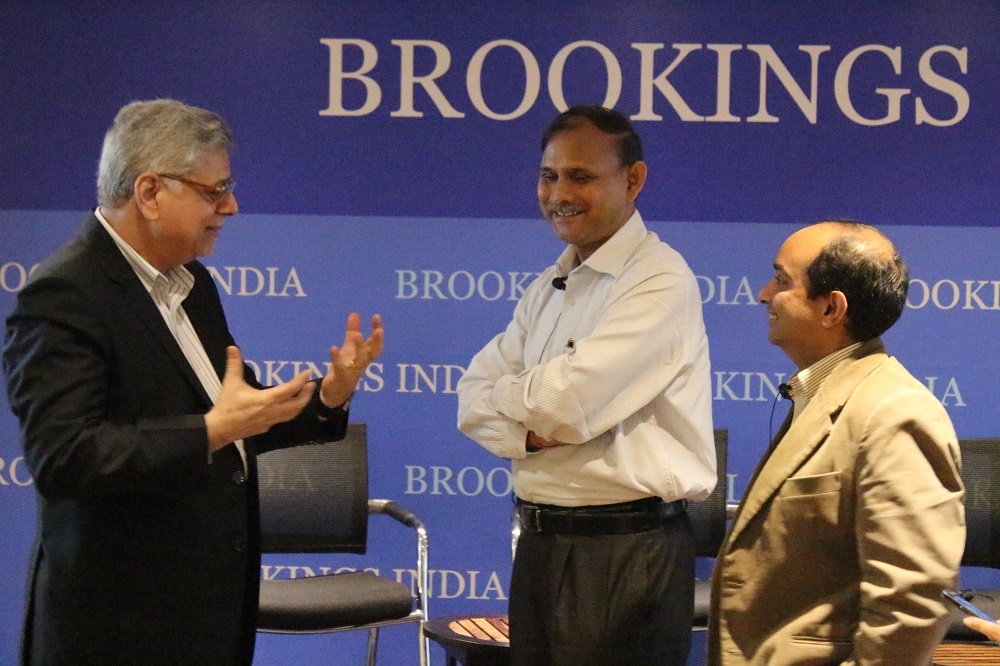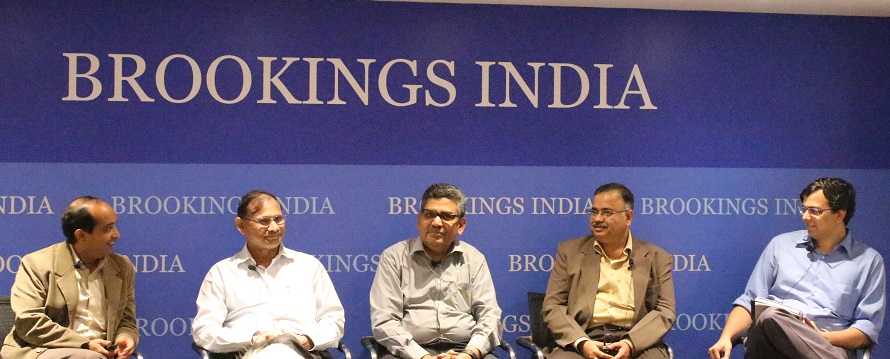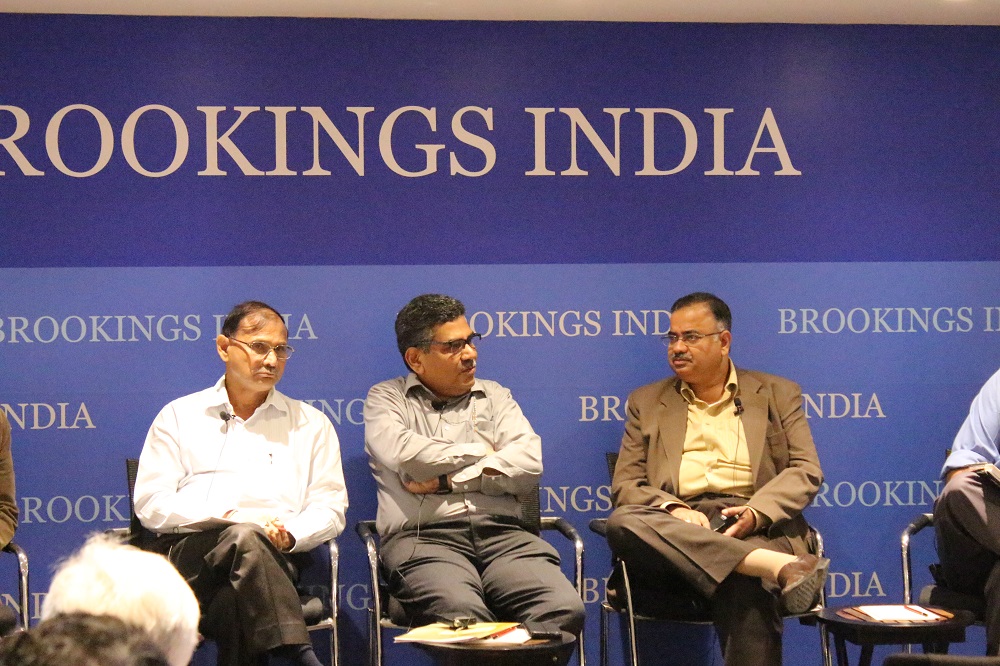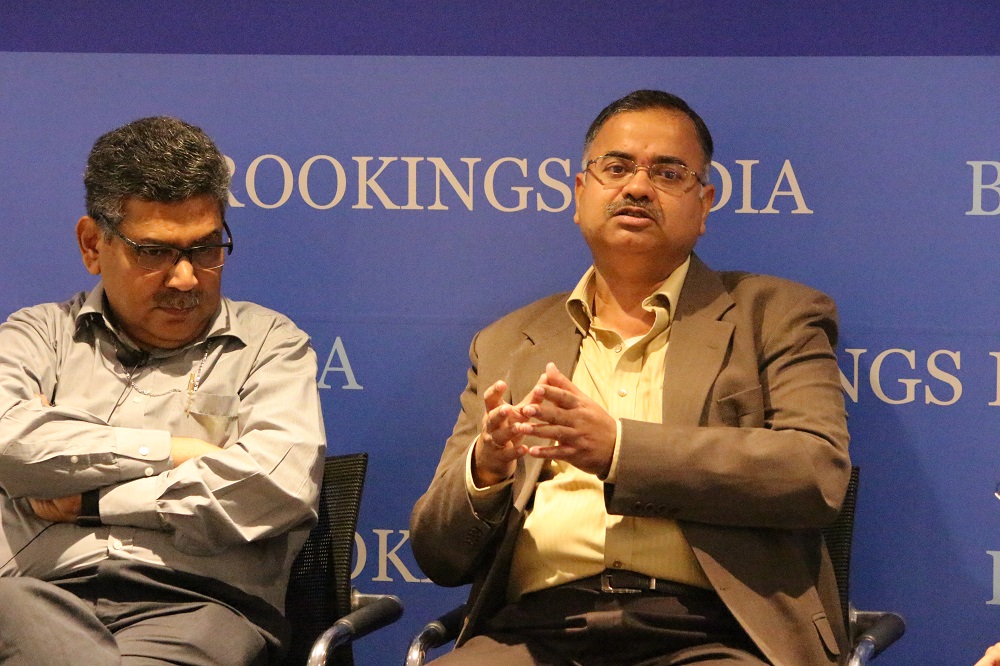

8:30 pm IST - 10:00 pm IST
Past Event
Content from the Brookings Institution India Center is now archived. After seven years of an impactful partnership, as of September 11, 2020, Brookings India is now the Centre for Social and Economic Progress, an independent public policy institution based in India.




Event Report
By Rohit Chandra, Abhishek Mishra, Rahul Tongia
On August 12, 2016, Brookings India hosted a panel discussion on “Private Participation in the Coal Industry” which aimed to examine the multiple roles of the private sector in India’s Coal industry.
Panel:
D. N. Prasad (Advisor, Ministry of Coal)
Animesh Sahay (Ex. CMD, Mahanadi Coal Limited)
Dr. Raman Srikanth (Industry expert and Advisor)
Dr. Rahul Tongia, Fellow, Brookings India – Chair
Rohit Chandra (Harvard University) – Moderator
Topics Discussed:
The discussions were meant to be non-attributable (Chatham House Rule), and below is a high-level overview of the deliberations. Given the nature of the topic, there was not expected to be a consensus or “solutions” but rather deliberations on different viewpoints and options.
Private Vs Public mining
The private sector has been involved in various activities in Coal India’s operations – mining is just one of them. During a period of capital constraints when production expectations of Coal India were high, subcontracting was a particularly capital-efficient way of increasing production and there are certain functions in mining which is believed to be undertaken better by private entities / contractors. Since 1993 the government introduced many policies that increased the role of the private sector but the idea of mining going all private is still dubious as CIL has successfully managed to outperform private-run mines.
In the past, quite a few government officials have endeavoured to work with heavy earth-moving machinery (HEMM) contractors and Mine Developers and Operators (MDO) as partners and stakeholders. MDOs put in competitive bids and once they win the bid they were on the back foot realising how tough it was to run a mining business. Unfamiliarity with the mining culture and norms was one of the main reasons that even well-intentioned, cash-rich captive block owners were unable to make much progress on the blocks they were allotted prior to the recent cancellations. The amazing performance of Coal India in the past few years and failures of many captive block owners has raised doubts about this model of private participation and it is not clear whether private mining companies really have the capability to expand production anywhere near the government’s optimistic projections.
The “twin swords of Damocles” that are hanging above coal mining companies and their managers: the Contract Labour Abolition Act, and the outdated owner-agent-contractor burdens of responsibility also seeks attentions of policy makers.
The legality of HEMM subcontracting has never been explicitly established, apart from a few Attorney-General opinions which have given legal shelter to CIL so far. It is not beyond the realm of possibility that someone will file a PIL against CIL for contravention of the Contract Labour Abolition Act, which CIL will likely lose. There seems to be little political will to change this legislation. Since a majority of the coal-related legislation is still from the time of managing agencies, there is a serious mismatch in the responsibilities borne by the contractor (who should not technically be operating) and by the owner, which makes accountability in the industry difficult. Effectively, much of the subcontracting mining economy functions in this legal grey area, which is a major risk all companies are taking on.
One recommendation is to clarify, if not amend, the rules to explicitly make such participation legal. This could tie into broader regulation of the private sector for environmental, safety, and labour compliance.
Commercial mining: What is the government’s agenda?
Progress of commercial mining and when it would likely be implemented is the key question among miners and investors. While the norms are known to have been developed internally within government, there has been a wait-and-watch strategy from the government, particularly after the coal surpluses that have emerged recently. One likely probability that did emerge is that when commercial mining regulations are implemented, coal mining companies would be allowed to determine their own price and pick their buyers. This would be a major departure from the tight market control that has dominated the industry since nationalisation.
On the other hand, there was some debate and scepticism over the appetite for commercial mining by large-sized global entities. They would not be interested in many of the blocks as allocated today as these are small, especially considering the scale and technology at which they optimise. This is before any thoughts towards the viability and economic returns for such an endeavour.
Technological implications of various contracting modes
What defines efficiency and what is an appropriate measure of “efficiency.”? If cost is the only “efficiency” measure, then new technologies will never enter India because we have reached a very comfortable, low-cost equilibrium in open-cast mining already. Thus, defining “efficiency” in broader parameters may be necessary to include things like compliance, environmental sustainability etc. One of the changes over time that has occurred within Coal India is that the outsourcing contracts have been gradually lengthened from three-five years to closer to nine years which is approximately the lifetime of the acquired machinery. This has improved the financing options and utilisation of equipment for outsourcing contractors. But in some cases, procurement restrictions, domestic unavailability of spares and internal processing delays have forced CIL subsidiaries to work with smaller or less efficient machinery, which is a serious problem. This is an area open for improvement.
How MARC is impacting the mining industry
Maintenance and Repair Contracts (MARC) have improved the utilisation of machinery over the last 10-15 years, as CIL’s contracting practices have started emulating practices started by Tata Steel in the late 1990s. This puts greater responsibilities on the sales agents of machinery to maintain a certain level of utilisation and productivity. But even now, very few suppliers are willing to sign long-term MARCs for reasonable prices. Part of the reason is that even equipment manufacturers face a whole range of currency and commodity risks, which are very hard to smooth out over time. And there are no domestic companies which can regularly deliver the required volumes of equipment and maintenance. It is illustrative to observe that selected parts, like tyres for large equipment, are controlled by a handful of players that are much bigger in market power than the equipment companies themselves.
People linked to Mining
Mining also impacts the lives of the people living in the area and it is important to work with mining affected communities to effectively deal with their grievances, assure proper rehabilitation and resettlement, and generally afford dignity to the people most affected by mining. There is a strong responsibility of the owner of the mine (or their representatives) to interact directly with the people who work at the mine; this imbues a sense of direct communication rather than any “chicanery” sometimes associated with subcontractors.
Other Discussion
In addition to specifics related to public versus private, there was extensive discussion, including with the audience, on the broader challenges of coal, especially for the power sector. It was observed that one couldn’t easily solve this issue just looking at the coal sector without also looking at the broader “ecosystem”.
Like other products of the Brookings Institution India Center, this report is intended to contribute to discussion and stimulate debate on important issues. The views are of the discussant(s), contributor(s) or author(s). Brookings India does not have any institutional views.
Event Announcement
Brookings India is hosting a panel discussion on “Perspectives on Private Participation in the Coal Industry”.
This panel will be the first in a series of focused discussions on the trajectory of private participation in the Indian coal industry. In the last twenty years, there has been a marked increase in the amount of private involvement in the Indian coal industry. The primary mode of this has been through subcontracting, or outsourcing, with gradual increases in MDO involvement and captive mining as well. While these changes have certainly led to certain production efficiencies, there is still considerable room for improvement. In this session we will discuss the following three issues in depth with our Panelists. Following the panel discussion the floor will be open for questions from the audience.
1. Contract Management and Risk Sharing Between CIL and Outsourcing Companies
2. Technological Implications of Outsourcing vs. MDOs vs. Commercial Mining
3. Labour Implications of Private Mining: How can we maintain standards?
Panelists* (Proposed)
N. Prasad * (Advisor, MoC)
Animesh Sahay * (Ex. CMD, MCL)
Dr. Raman Shrikant *
Moderated by
Rohit Chandra (Harvard Kennedy School)
Brookings India is a New Delhi-based affiliate of the Brookings Institution, Washington, the world’s oldest independent think-tank. Established in 2013, Brookings India serves as an important platform for developing and disseminating policy recommendations for Indian policymakers. Our work is centered on the Brookings Institution motto of “Quality, Independence, and Impact”.
If you have any concerns about Brookings India policies of recording and sharing information during and after our events, please contact us.
RSVP:
Abhishek Mishra
Brookings India
[email protected]
+91 11 2415 7600
(D) + 91 11 2415 7751/ (M) +91-78 3898 6737

Rahul Tongia, Anurag Sehgal, Puneet Kamboj
2020
Online Only
3:00 am - 4:40 am IST

Saneet Chakradeo
August 18, 2020